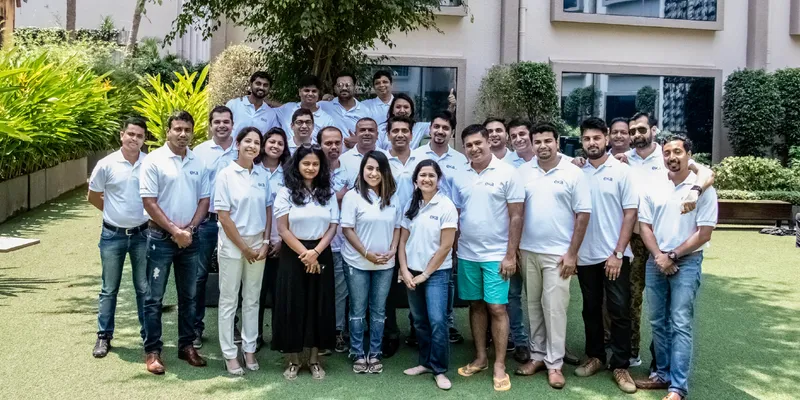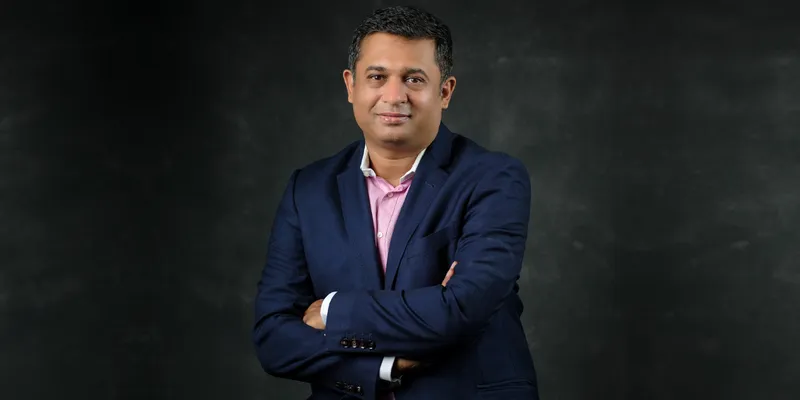How this Punjab-boy quit his well-paying job abroad to build a successful startup in India
Growing up in the small town of Moga in Punjab, Eka Software Solutions Founder and CEO Manav Garg didn’t speak any English till he went to college.
When Eka Software Solutions Founder and CEO Manav Garg speaks in English, it would seem like he’s been familiar with the language all his life. But it wasn’t until college that he actually started speaking it.
Manav grew up in a middle class family, in the small town of Moga in Punjab. He saw his father repeatedly fail at entrepreneurship (four times to be precise), but that did not deter him from taking the plunge himself, after quitting a well-paying job in Singapore.
After getting his engineering degree (in Instrumentation and Control) from NIT (then REC), Jalandhar, Manav armed himself with an MBA from IIFT (Indian Institute of Foreign Trade), Delhi. He became a trader at G Premjee Trading in Singapore, earning a handsome salary, and travelling all across South East Asia. Three years into his job as a coffee trader, he saw an entrepreneurial opportunity through a gap waiting to be filled.

Eka Founder Manav Garg (in shorts) with his Bengaluru colleagues
“I was a trader, trading actual coffee. Going to Vietnam, Indonesia, Thailand and you know, in the fields actually. Sitting with buyers like Lavazza and Folgers Coffee, which is Procter & Gamble, and selling them coffee. During my experience I met some 400-500 companies around the globe. I saw there was no system (to manage trading and risks in their businesses), I was working on spreadsheets, so I thought let's just leave my job and try to see what can be done [sic],” he tells YourStory Founder and CEO Shradha Sharma.
From selling coffee to starting up
Manav left his job without consulting anyone, he didn’t even tell his parents.
His mother had actually been quite opposed to the idea of him starting up, perhaps from her experience of having closely seen Manav’s father fail at it. To add to the odds, he had “no clue” about software, he simply knew that it could be the answer to plugging the gap he had identified.
This was around the turn of the millennium and software was nowhere as common as it is now. It was after quitting his job that he called his friends from engineering to ask, “What is this software?” They suggested Manav come to “Bengaluru or India and figure it out.” And he literally just packed his bags and moved back to India. Initially, Manav had plans of starting up in Delhi, owing to the fact that it would be closer to his hometown.
“But when I came to Bangalore, I loved the weather, I loved the people, I said fine, (this) looks like a software place, so let's start the company here [sic],” Manav recalls.
He met with people at IT giants such as Infosys, Wipro and TCS to get a grip on all things software and IT. Manav’s startup Eka’s first product came out in nine months. Started in 2004, the first year of the Bengaluru startup’s operations were financed by the then 30-year-old Manav’s personal savings, after which he approached his former employer and managed to get a seed funding of $1 million. In 2009, Eka secured a $10 million funding from venture capital firm Nexus; in 2013, global private equity fund Silver Lake led a $40 million plus funding round in the startup.
The early days were challenging, but Manav stayed unfazed and managed to navigate them. Today, Eka is a global leader in providing innovative solutions that help customers digitise and improve their direct materials business functions across agriculture, energy, metals, mining, and manufacturing industries.
“Way back in 2004 there were no software companies, there were no angel investors at that point in time. And we started with a client server, so only 2015-16 onwards we actually moved towards cloud, so I have seen the journey of building the product from India, from very close quarters and a lot of challenges,” Manav shares.
Built to accelerate a customer’s digital journey to the cloud, Eka’s platform-driven solutions enable businesses to quickly adapt and overcome complex challenges in trading and risk, supply chain, business collaboration and financial management. With over 400 employees, Eka supports more than 100 customers globally. The startup’s commodity management software is used by multi-billion-dollar companies such as Unilever, Cargill and Cofco. Eka competes with the likes of OpenLink, FIS, Sapient, Accenture, Trayport, Allegro, ABB, Triple Point, SAP, and Amphora. In 2013, Eka made two overseas acquisitions within a matter of months -- EnCompass Technologies, a Canada-based provider of energy transaction and risk management software, and Matrix Group, an Australian software company specialising in configurable commodity bulk handling and management systems for the mining and grain industries.
“Way back when we’d go to a Fortune 500 company, the global CIO would say, ‘Son, here is a box of chocolates please, I'm happy to trust you with that, but I can't give you millions of dollars of business.’ This was way back in 2006. That has changed now, so I'm really glad India has come very far now where we are able to compete with the likes of SAP and FIS, and very large companies, and are able to earn the trust of the global clients, for their mission critical systems.”
Building from India for the world
Manav always had a dream “to come to India and create something.” As he was getting ready to move to India from Singapore, Manav remembers many people questioning his decision.
“I was in Singapore, people said, go to (Silicon) Valley, go to New York, London use their capital available, ‘why (are) you coming to Bangalore? You can outsource from Bangalore!’ I said no, I want to take the challenge up and do something which is very unique from India, which has not been done [sic].”

Eka Founder Manav Garg is a big believer in the India story
As a startup serving the globe, Manav and Eka could literally be anywhere, yet they choose to be headquartered right here in India. It has offices around the world, in geographies such as North America, Europe, the Middle East, Asia and Australia.
Around five years back, Manav did try working out of New York for a year, but he figured he found India more exciting.
Watch video:
“I like being here in India because of the energy that we have. I love creating things and I think India is in a unique position in its journey, where a lot of things are getting better, whether it is infrastructure in India, whether it is digital infrastructure, which is what the government is also helping build and entrepreneurs are also equally enthusiastic about it. So it is the stage where things are getting built [sic],” says Manav.









